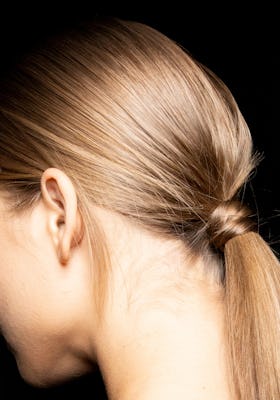(Hair)
I Stopped Using Shampoo — & My Hair Changed For The Better
Experts weigh in on why not washing can work for you.

I wish I could say that my chronically flaky scalp is my secret shame — but sadly, it’s not much of a secret. With dark brunette roots as its backdrop, my dandruff shines; set against an all-black wardrobe, the flakes positively pop. Well, make that “popped.” Ever since I stopped washing my hair, my head has been nearly flake-free. I’m not exaggerating. My "no-poo" routine has actually turned out to be the best dandruff treatment I’ve ever tried, and I’ve tried them all.
I got the idea from my face. After learning about how over-cleansing can lead to a terrifying combination of dehydrated skin and increased oil production, I phased out my face wash. A week of splashing with water later, my complexion was 75% clearer. Hmm, I thought. Could over-cleansing be the culprit for my simultaneously flaky and oily scalp, then?
Yes, and it even has a name. “We call that being ‘trapped in the cycle,’ and the concept is often misunderstood,” Jackie De Jesu, a hair expert and the founder of Shhhowercap, tells The Zoe Report. “If you over-wash your hair, then it strips your scalp of its natural oils.” Without sufficient oil, the scalp becomes dehydrated and potentially flaky.
“This imbalance creates the illusion of oily hair, because your scalp’s [oil production] is thrown into overdrive to compensate,” De Jesu adds. Then the cycle starts: You assume you need to shampoo away the extra oil, which makes the scalp even drier, which leads it to produce more oil to make up for the fact that it’s so darn dry. “In fact, if you stopped shampooing so frequently, then your scalp would level out and be less oily,” she says. And, in my case at least, less flaky.
Before enacting my shampoo ban, I washed my hair pretty much every day. I know, I know, that’s a lot — but I have thick curls and bad bedhead, and felt like I needed a fresh wash for my hair to look best. According to De Jesu, I was actually sabotaging my strands. “It’s unnatural for our bodies to be washing our hair so frequently,” she says, and that can lead to “increased breakage, dryness, dull color, and frizz,” as well as the aforementioned dry-meets-oily scalp situation.
As soon as I stretched out my wash days — first to every other day, then to twice a week, then to almost never — my hair bounced back, quite literally. Not only is my dandruff gone, but my curls look healthy and springy, no matter how long it’s been since my last shampoo. (It took about two weeks for my scalp to adjust and not produce so much extra oil, by the way. Headbands are your friend in the transition phase.)
Lorraine Massey, hair stylist and creator of the Curly Girl Method, isn’t surprised by my results. “Sulfate shampoo is a basic detergent, and creates the same lather, suds, and bubbles found in dishwashing and clothing detergents,” she tells TZR, referring to sodium lauryl sulfate, or S.L.S., a common ingredient in most mainstream shampoos. “When we over-wash our natural, organic hair fiber, it begins to wear out like any article of clothing would if we washed and wore it every day of our lives.” (Mind = blown.)
To get a sense of how, exactly, this works, Massey suggests a fun little exercise: Put a drop of shampoo on a sponge, add water, and rinse it out. “Notice how much water it takes to rinse out the small droplet of shampoo — it takes gallons and yet it still holds on to the frothy stuff,” she says — and your hair does, too. “The soap holds on to the residue, leaving behind salty deposits from the sodium that settle on the scalp, creating dry, itchy, and dandruff-like flakiness.”
So, how often should you be shampooing for optimal scalp and hair health? “NEVER,” writes Massey in an email, emphasis hers. “It is truly possible to forgo shampoo completely.” She’s been shampoo-free for an impressive three decades and counting, and says the secret is using just one product that can cleanse and condition. This is often called “co-washing,” or the “no-poo” method, and it works for all hair types. “For example, CurlyWorld’s ShamFree is a scalp and hair cleansing and conditioning detangler, all mixed into one," Massey says.
If you’re not ready to commit to the no-poo life, that’s fine. You can theoretically get similar results from significantly scaling back on shampoo — say, using a sulfate-free version once a week instead of three times a week. “I went from washing my hair every other day to now washing it once every five to seven days,” De Jesu says. “My personal journey has brought benefits like additional shine and thickness. My hair also grows notably faster.” On “off” days, De Jesu keeps her hair dry by wearing a Shhhowercap in the shower. I do the same; although I do often wet my hair in the shower without shampooing, just to refresh my curls a bit.
Afterward, I comb and spritz with a leave-in conditioner. Oh, yeah, I’ve effectively given up on traditional conditioner, too — but that’s another story.